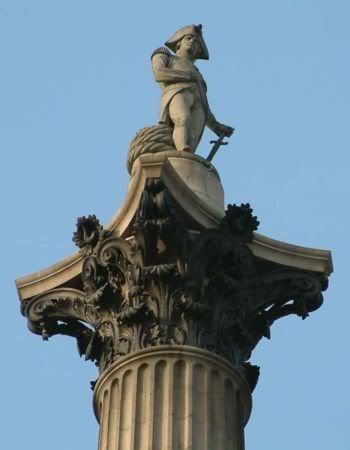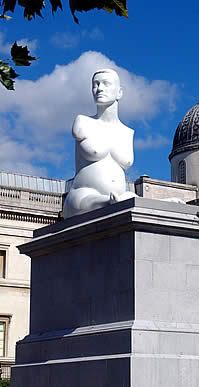
Rule, Britannia!

Rude Britannia.
Lord Nelson's column stands in the center of London's Trafalgar Square, the city's symbolic heart. At the corners of the square, statues of celebrated political and military figures on three plinths, or bases, have been supplemented for the past two years with a different kind of monument: to the classless elite's new standards based on cultural Marxism and ugliness inflicted on the helpless population in the name of authenticity.
Along with the relics of a formerly self-confident society with a sense of gravitas, the statue Alison Lapper Pregnant has occupied a strategic place on the fourth plinth in the square. It portrays a naked, real person's misshapen body.
You understand the symbolism. Uncompromising. Nothing to hide. A cool Britannia taking the piss out of those laughable old celebrations of nationhood. Above all, Homage to the Victim. Yes, Alison is a victim of Nature, not Man, but that will do.
"I regard it as a modern tribute to femininity, disability and motherhood. It is so rare to see disability in everyday life – let alone naked, pregnant and proud," said Alison Lapper. The Telegraph magazine said, "If you like art to be brave, original and challenging you'll love the Fourth Plinth in Trafalgar Square." And chortled, "Since its award-winning refurbishment, Trafalgar Square has regained its place as London’s central piazza where people can meet and relax." As though the space had previously been as empty as the Arabian desert, and Alison added a touch of casual chic that left people feeling relaxed, good all over.
"Its re-opening has seen visitors increase by more than 200 per cent. These stunning pieces of modern art exhibited on the fourth plinth will further enhance the Square’s appeal. And provide a bit of company for Nelson." A bit of company, ha ha, yuk yuk.
Well, Alison's had her brush with fame, and much good may it do her. Time's up. The statue's been removed — not because the light of graciousness has broken through, but because it had been scheduled for a two-year run and is now replaced with another modern sculpture.
Brendan O'Neill, writing in Spiked, has a few appropriate thoughts on this chapter in the barking-Chihuahua cultural politburo's determination to undo the United Kingdom's cultural heritage:
Along with the relics of a formerly self-confident society with a sense of gravitas, the statue Alison Lapper Pregnant has occupied a strategic place on the fourth plinth in the square. It portrays a naked, real person's misshapen body.
You understand the symbolism. Uncompromising. Nothing to hide. A cool Britannia taking the piss out of those laughable old celebrations of nationhood. Above all, Homage to the Victim. Yes, Alison is a victim of Nature, not Man, but that will do.
"I regard it as a modern tribute to femininity, disability and motherhood. It is so rare to see disability in everyday life – let alone naked, pregnant and proud," said Alison Lapper. The Telegraph magazine said, "If you like art to be brave, original and challenging you'll love the Fourth Plinth in Trafalgar Square." And chortled, "Since its award-winning refurbishment, Trafalgar Square has regained its place as London’s central piazza where people can meet and relax." As though the space had previously been as empty as the Arabian desert, and Alison added a touch of casual chic that left people feeling relaxed, good all over.
"Its re-opening has seen visitors increase by more than 200 per cent. These stunning pieces of modern art exhibited on the fourth plinth will further enhance the Square’s appeal. And provide a bit of company for Nelson." A bit of company, ha ha, yuk yuk.
Well, Alison's had her brush with fame, and much good may it do her. Time's up. The statue's been removed — not because the light of graciousness has broken through, but because it had been scheduled for a two-year run and is now replaced with another modern sculpture.
Brendan O'Neill, writing in Spiked, has a few appropriate thoughts on this chapter in the barking-Chihuahua cultural politburo's determination to undo the United Kingdom's cultural heritage:
The statue captured much of what is rotten in the heart of new Britain. When it was first unveiled, some art critics gushed about how it would challenge people’s perceptions. ‘Against a sky the colour of old underwear, and a circle of buildings that might as well be built of concrete for all the life and warmth their stony facades exude, Quinn’s womanly but warrior-like Lapper [glows] like a beacon’, said one overexcited observer.
In truth, Alison Lapper Pregnant was about as challenging as old underwear. It was a drab monument to the backward pieties of our age. It showed that we value people for what they are rather than what they achieve. In our era of the politics of identity we seem more interested in celebrating individuals’ fixed and quite accidental attributes - their ethnicity, cultural heritage or in Lapper’s case, her disability - rather than what they have discovered or done in the world outside of their bodies. We prefer victims to heroes.He went on to deliver the coup de grâce:
Alison Lapper Pregnant celebrated what nature, in all its arbitrariness, does to humans rather than what we do to shape, lead and transform the world around us. In this sense, it captured the deeply conservative nature of the identity agenda. The politics of identity privileges fate over self-made destiny. In all the talk of black, Muslim, gay or disabled ‘identity’ - categories created and sustained by the authorities to describe sections of the population who apparently have special needs and desires - we can glimpse the reintroduction of fate into public life, where individuals’ fortunes are seen as being determined by their skin colour or physical afflictions or cultural background rather than by the choices they make and actions they take.Lord Nelson, on his lofty pinnacle in the square, was not portrayed as a giant eye patch, and his empty sleeve is no more than a detail. For our ancestors, it was enough that the man was responsible for destroying Napoleon's fleet in the Egyptian harbor at Aboukir and quite possibly prevented the Little Corporal from invading England by handing him another thrashing at Trafalgar. Nelson was killed in the battle. He was only a hero, not a victim.


2 comments:
Don't set out to raze the shrines, you'll frighten the men. Enshrine mediocrity, and the shrines will be razed.
- Ellsworth Toohey, "The Fountainhead"
Seems the real goal was to demolish Nelson's column and all it stands for - but Mr.Toohey's advice was followed..
War is a fascinating subject. Despite the dubious morality of using violence to achieve personal or political aims. It remains that conflict has been used to do just that throughout recorded history.
Your article is very well done, a good read.
Post a Comment